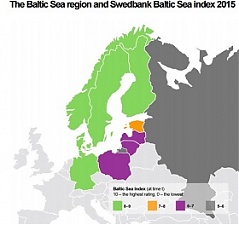Analytics, Baltic, Baltic States – CIS, Economics, Markets and Companies, Rating
International Internet Magazine. Baltic States news & analytics
Thursday, 25.04.2024, 15:00
Latvia continues to lag behind Baltic Sea region's average level
 Print version
Print version |
|---|
The quality of the region’s business environment, meanwhile, has remained unchanged from last year, which places the Baltic Sea Region among 23% of the world’s most competitive countries. Germany and Sweden have been showing improvement this year, but these countries’ performance have already been well above the region’s average. Lithuania, too, has managed to improve its competitiveness for the fifth consecutive year, Swedbank said in the Baltic Sea Report.
The region’s most developed areas include education, logistics and governance where it is among the top 20% in the world. The region’s growth is hampered by significant differences in the countries’ business environments, which in the report have been mentioned as the region’s greatest challenge.
Latvia continues to trail behind the region’s average level, and the country’s score in the Baltic Sea Index has dropped from 6.9 to 6.8 points. Latvia, however, is ranked above Poland and Russia, but lower than Estonia and Lithuania.
Latvia’s relative position has worsened in areas like education, labor and financial markets, but remained unchanged in governance. Latvia has only shown improvement relative to its competitors only in three areas – entrepreneurship, tax policy and infrastructure.
Latvia’s economic growth has been unexpectedly weak in 2016. The main reasons for the slowdown include a delayed release of EU funding, crisis in the construction sector and consumers’ reluctance to spend. The lowest point, however, is probably over already.
With EU funding expected to flow into the economy and lending to businesses picking up, investment growth is expected to resume, which will also speed up the economy’s overall growth.
This, however, is not enough to ensure sustainability of Latvia’s faster growth. The Baltic Sea Index shows that reform progress has been negligible. Latvia is gradually running out of its labor force resources, which means that strong and sustainable growth can only be ensured by raising productivity and efficiency, as well as a wise fiscal policy.
Like in previous years, the ball remains on the policy-makers’ side, Swedbank concludes.








 «The Baltic Course» Is Sold and Stays in Business!
«The Baltic Course» Is Sold and Stays in Business!

